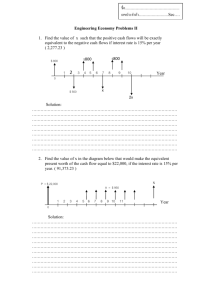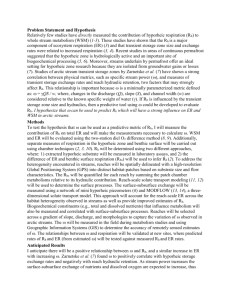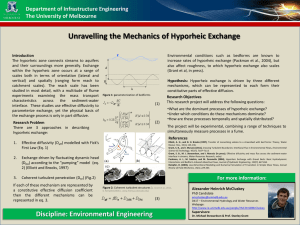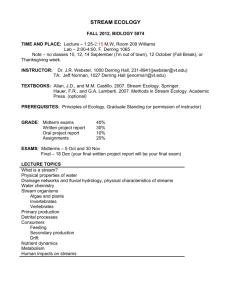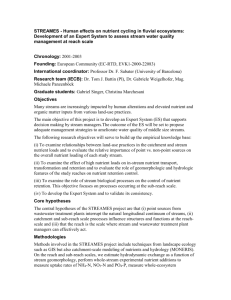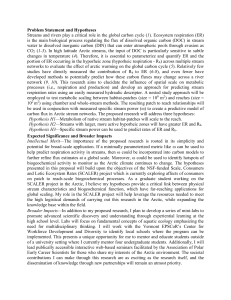Geomorphic Complexity – Hyporheic Exchange – Nitrogen
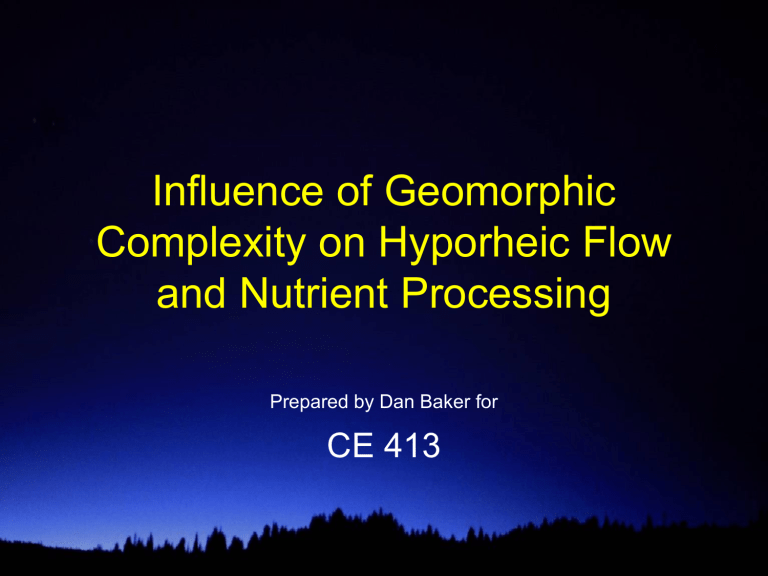
Influence of Geomorphic
Complexity on Hyporheic Flow and Nutrient Processing
Prepared by Dan Baker for
CE 413
Why do we care?
• Vast areas of ocean fed by the worlds rivers are dying
• Continuing population growth demands more fertilized crops and fossil fuel usage
• Restoration $$$ is paying for form -- not function
General Hypothesis
Stream
Geomorphic
Complexity
Hyporheic
Exchange
Nutrient
Uptake
• Stream geomorphic complexity enhances hyporheic exchange increasing the potential for nutrient uptake
Stream
Geomorphic
Complexity
Hyporheic
Exchange
Nutrient
Uptake
• Collective influence of physical and hydraulic variation within a stream
– Bedforms
– Planform
– Substrate texture
– Woody debris
– Hydraulics
– Vegetation
Mosaic of Complexity
Topography
Hydraulics
Substrate
Geomorphic Complexity
• Why does it matter?
– Biological
• Fish and aquatic insect habitat
• Organic matter retention
– Physical
• Promotes hyporheic exchange
• Evidence of natural flow regime
– Chemical
• Nutrient processing
Multiscale Complexity
Frissell (1986)
Textural
• Composition and spatial distribution of patches of grain sizes
– Bed patches with differing grain size distributions and permeability
(Buffington and Montgomery 1999)
Downstream variation
• Bedform spacing
• Variation of thalweg elevation
• Water surface concavity
• Longitudinal roughness
Measures (cont.)
• Planform Variation
– Sinuosity
– Width variability
• Amplitude & wavelength
Q
Stream Bank
Amplitude
( a
)
Wavelength ( l
)
Measures (cont.)
• Flow obstructions
– Woody debris
• Instream transient storage
– Vegetation
– Eddies/backwater
• Hyporheic flow
– Area of storage & exchange coefficients
• Hydraulic conditions
– Velocity & depth
Stream
Geomorphic
Complexity
Hyporheic
Exchange
Nutrient
Uptake
• Hyporheic is a Greek word meaning
“under river.”
• Exchange of stream water between surface water / flow through stream bed
Hyporheic Flow
• Multi scale phenomena
– Spatial – centimeters to kilometers
• Geology & Channel Morphology
– Temporal – minutes to months
• Flow path length & Sediment hydraulic conductivity
Benefits of Hyporheic Flow
• Connectivity between aquatic and terrestrial systems
• Temporal storage of stream water and nutrient processing
– Increased exposure to microbially rich sediments
• Increased stream habitat
– Invertebrates
– Salmonid spawning redds
• Temperature moderation
• Contaminant removal
How do we measure hyporheic flow?
• Well method
• Tracer method
• Developed by
USGS
• Numerical model to fit parameters to actual flow conditions
OTIS Model
Stream
Geomorphic
Complexity
Hyporheic
Exchange
Nutrient
Uptake
• Increased exchange across microbially rich stream bed
– Provides sufficient exposure and ideal conditions for nutrient uptake
History of Nitrogen Fertilizer
• Naturally occurring nitrogen sources
– Microbes & lightning
– Lightning
• Before fertilizer, crop production limited by naturally available nitrogen
• Fritz Haber discovered an energy hungry process to ‘free’ nitrogen in 1909
• Post World War II, the US government had a surplus of bomb building ammonium nitrate
• Used to boost agricultural production population was free to increase
Nitrogen & Global Population
Understanding the Transport of
Nitrogen
• Originally rivers were thought of as conveyor belts
• Then scientists thought all rivers removed nitrogen proportional to their size
• Now we believe that small streams remove the more nitrogen than large streams
Headwater streams encompass up to 80% the stream network
“The physical, chemical, and biotic integrity of our nation’s waters is sustained by services provided by wetlands and headwater streams.”
-Where Rivers are Born
• Flood control
• Extensive wetlands
• Trap sediment
• Transform carbon from inorganic organic
• Maintain biological diversity
Stream Nitrogen Cycle
Experimentally
Added NO
3
Our Current Study
• Follows general hypothesis of this talk
• Uptake in agricultural vs urban stream
• Incorporate flow variability
Summary
• Many measures of complexity
• Water doesn’t just go downstream
• Small streams are important
• Restore not just physical form but ecological function
